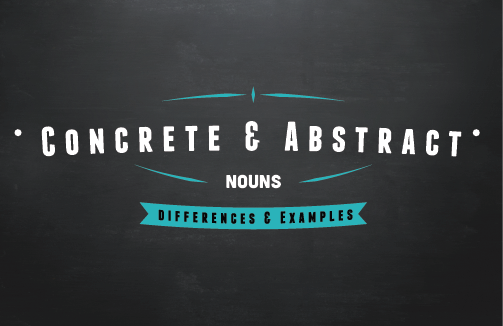Concrete and Abstract Nouns

Concrete and abstract nouns are types of common nouns. If you need an overview of the different types of nouns, click here.
Concrete nouns
Concrete nouns are usually very easy for students to understand. They are things that you can see or touch. Just look around you, everything that you can see or touch is a concrete noun. For example:
- chair, table, car, book, desk, apple, baseball, pencil, notebook, laptop, phone.
Abstract nouns
Abstract nouns are nouns that cannot be seen or touched. They are things like ideas, feelings or emotions. For example:
- love, happiness, excitement, criticism, reason, strength, morning, afternoon, beauty.
Sometimes abstract nouns are difficult to identify because learners don't think things like trust or bravery are nouns, but they are.
Remember that certain English words can function as more than one part of speech depending on how they are used in a sentence.
For example, let's look at the word "love." Depending on the meaning of the sentence it could be a verb or a noun:
- I love my dog. (Love is a verb in this sentence).
- Love makes the world go around. (Love is an abstract noun in this sentence).
Here's another example with the word "sleep":
- I sleep eight hours each night. (Sleep is a verb in this sentence).
- Sleep is important for good health. (Sleep is an abstract noun in this sentence).
Abstract nouns are often uncountable nouns but they can be either countable or uncountable (e.g., morning/mornings, situation/situations).
More examples of abstract nouns
Since abstract nouns are more difficult to identify than concrete nouns, here are a few more examples to help you better understand.
Abstract nouns showing emotions or feelings
|
happiness anger disappointment disbelief excitement |
fascination grief love hate pain |
pleasure power sadness joy worry |
Abstract nouns about ideas and concepts
|
trust compassion confidence courage luck leisure security situation information |
advice permission criticism difficulty reason crime adventure belief democracy |
dictatorship energy faith forgiveness imagination luxury opinion opportunity success |
Abstract nouns about attributes about states
|
honesty intelligence jealousy patience stupidity wisdom health beauty bravery |
humor curiosity peace unease weakness charity failure brilliance genius |
skill dexterity integrity deceit humility arrogance pain misery boredom |
Abstract nouns about time
|
week day month year decade |
morning afternoon evening daytime dawn |
time era moment occasion minute |
Hopefully, this explanation has helped you to better understand the differences between abstract and concrete nouns.
